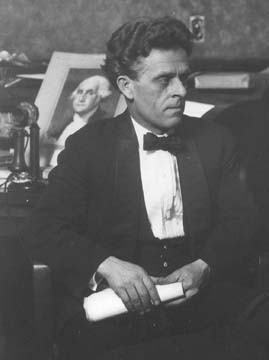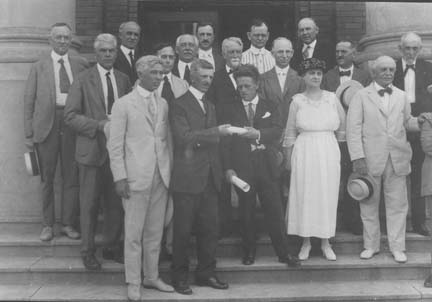Reading from, and comments on, the Nebraska Laureate Address of 1921
This paper was presented by Robin Neihardt at the annual Neihardt Spring Conference, April, 2006

On the occasion of being named the Poet Laureate of Nebraska, John Neihardt delivered his laureate’s address June 18th, 1921 to representatives of the State Government and the State University at the Temple Theatre in Lincoln, Nebraska:
I want to talk to you about the technique of Poetry and the relation of that art to education and the social process in general. In order that you may be able to judge as to the relevance of my remarks, I must first tell you what I understand by the word “education”…
I would say that education is fundamentally a spiritual process. In its proper function it is concerned less with the problem of acquiring the means of life than with the far more difficult one of knowing what to do with life after one is in possession of the means to live…
However much a man, as viewed by the envious eyes of his neighbors, may gain in apparent worth by the possession of material things, it remains true that not one jot is added to the real stature of the man by virtue of that possession; for a man can be no other than that which he truly is, as distinguished from what he has. And it is with what a man is—that is to say, with personality—that education must be chiefly concerned. It is the process of making a man rich in the only values that can not be acquired by accident, or theft in any of its many disguises, and that can not be lost by such means… And in this sense, it is the prime function of education to make men social beings; to make them, insofar as may be possible, citizens of all time and of all countries; to give them the widest possible comprehension of a man’s relation to other men and to his physical environment; to substitute sympathy for prejudice in the list of human motives. In other words, the consciousness of the individual must be extended to include the race consciousness. It must be made possible for the one to live vicariously the life of the many from the beginning.
I am sure you understand that Neihardt’s use of “race consciousness” is not “racial consciousness.” Neihardt meant the sum total of the soul and spirit of all mankind; accumulated generation by generation since the dawn of creation.
With an understanding of education, while moving his audience toward his understanding of poetry, John Neihardt then turned to the issue of language:
You will agree with me in defining language as a means for communicating states of consciousness. Now if all states of consciousness were capable of communication by direct factual statement, then the study of language would indeed be no more than the study of words arranged according to the rules of grammar and syntax. But you have all noted that in the higher realms of human utterance, certain effects are obtained that can not be explained satisfactorily by the most industrious parsing and analysis. Something subtle and powerful somehow escapes between your nouns, pronouns, adjectives, verbs, adverbs, prepositions and conjunctions. Something is present in the greater moments of human utterance that quite eludes your finest mesh of case, number, tense, mode. At such moments, you become aware that it is a mere skeleton you have been analyzing, and that some mysterious spirit lives among those dry bones. At such moments, it is apparent that one might as well hope to explain the Aeneid by analyzing the food that Virgil ate, as to account, by means of mere verbal mechanics, for the miracle that has happened among your words.
As he reached the heart of the message of the address, Neihardt presented what he felt was the most important principle means in the economy of poetry:
The fourth principal means in the economy of poetry is the appeal to memory, and it is by far the most important of them all, because it has to do with the very subject-matter of the art. There are two kinds of memory—that of the individual and that of the race. That poetry which appeals to the individual solely through his recollection of his personal reactions to the narrow environment of everyday life, is minor poetry; while that which appeals to both the individual memory and to that all-embracing race memory—historical and literary tradition—is major poetry. It follows that the power which poetry will exert upon a given individual will be in direct proportion to his ability to respond to the memory appeal. The average person is fairly rich in individual memories, but poor in race memory—thanks to an educational system that emphasizes the so-called ‘practical’…
In the dynamics of poetry, the written word conducts the poetic suggestion, and serves to hurl across the mind of the hearer the latent, and often unsuspected, power with which his soul is charged. It is the soul of the recipient that must complete the work of wonder; and thus precious messages are passed from consciousness to consciousness across the ‘seas of misunderstanding’.
We have been in a period for some time where an individual can simply pronounce themselves an ‘artist’ or a ‘musician’ or a ‘poet’. Then they can establish their own meager standards for judgment without ever dedicating themselves to the craft and history of their art. Neihardt commented:
It has been the claim of these misguided enthusiasts and poseurs that they are writing democratic poetry; whereas, their product is so exclusively aristocratic, as someone has aptly remarked, that in the majority of cases no one but the authors can tell with any degree of certainty just what it is the authors are trying to communicate. Such so-called poetry may be considered democratic only in the very special sense that nearly everybody seems to be writing it; nor is this a matter for marvel, for if each individual is to set up his own standards of judgment, a long and faithful apprenticeship is no longer necessary, and anyone may produce his own poetry for home consumption. For my part, I am quite willing that this should be done; with the proviso, however, that the product shall be consumed at home!
John Neihardt concluded his address :
As we near the realization of that supreme social concept, our whole view of life and, consequently, of art, will be correspondingly modified. We shall come to insist more and more upon experts in all things. Respect for standards, love of order, will return. The petty personalism, that has long dominated us, will die away. Our poets will achieve the objective view of the world of men and things—and it is out of that view that all great art, as all great life, must grow.

